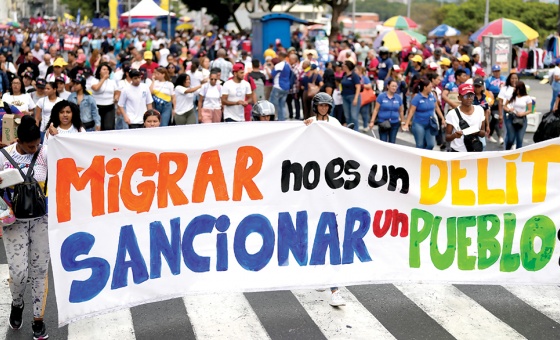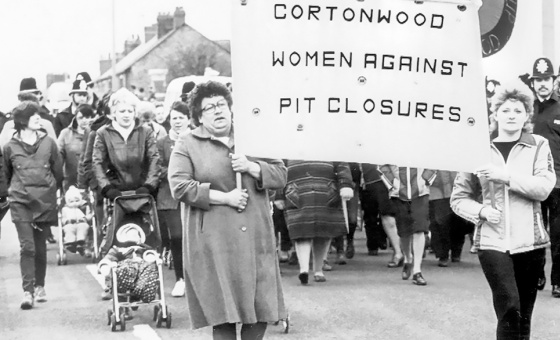This is the last article you can read this month
You can read more article this month
You can read more articles this month
Sorry your limit is up for this month
Reset on:
Please help support the Morning Star by subscribing here
ORGANISING doesn’t have to be all about the global North. We can learn much from the remarkable work taking place among nearly 18 per cent of the total world population.
Mariam Dhawale and Dr Ashok Dhawale from India, are two of the world’s most important organisers — and many of you reading this may never have heard of them.
After talking with them for an exclusive interview with the Morning Star, it is clear that both would run a million miles from such a description.
But unless organisers begin to appreciate the depth and quality of organising work taking place across the global South then we will continue to limit our chances of bringing about revolutionary change.
Mariam is the national general secretary of the All India Democratic Women’s Association, with a membership of more than 10 million women.
Ashok is the national president of the All India Kisan Sabha (AIKS) which has a membership of around 15 million, and was one of the leaders of the biggest and most inspirational strikes in world history when India’s farmers took action and won in 2020.
Both started as student activists in the Students Federation of India where they developed their commitment to bringing about a radical change in favour of the working class and farmers.
Mariam tells me: “I saw that there was a lot of poverty and inequality in India and this led me to a Marxist analysis. I then decided that the women’s movement was where I could make the biggest contribution.
“I went to work in a part of the country where the women’s movement did not exist. I had to learn the language and moved from village to village in Maharashtra State to build the movement.”
Ashok concurs: “When I was studying medicine I saw the tremendous poverty across India.
“In the public hospital I was working in, which was free at that time, I used to see illnesses such as tuberculosis, which you only really see in really poor countries.
“I quickly realised that the reason people were getting these illnesses was because the whole system was rotten and was skewed in favour of the rich over the poor.
“When I first joined the AIKS I met the inspirational woman leader Godavari Parulekar, who became the general secretary of our movement in 1986.”
Parulekar, a communist, believed that organising the working class and farmers was the best way to throw off the shackles of British colonial rule in India.
“She was my role model,” Ashok says.
Ashok was one of the organisers of the biggest strike in world history when farmers took action for 380 days in 2020 — but this had deep roots: “The things we have done in the last few years have become possible because of the years of organising by people who went before us.
“We have a very glorious legacy of the AIKS, which was founded in 1936.
“The primary aim of AIKS was to throw out the British rulers and gain independence for India.
“The second was against landlordism and that the land must belong to the tiller.”
Ashok tells me that the historic 2020 strike was a united struggle, with more than 500 farmers’ organisations coming together to form “a united farmers platform” from a range of political ideologies.
“Everyone recognised the dangers posed by the three farm laws being put forward by Prime Minister Narendra Modi’s government which were completely pro-corporate.”
The strike also won support from the Joint Platform of Central Trade Unions which created an important worker-peasant unity.
Ashok says: “Each organisation was able to make progress because of the past struggles we had taken up over the years.
“We went to the farmers for face-to-face village meetings to explain the impact of the changes.
“In the end, it was the determination of the people that forced Modi to surrender and repeal his proposals.”
Mariam adds: “We work in the villages as well as the cities. We work closely with the most marginalised sections of women in India.
“Some of the biggest issues facing women in India are unemployment and domestic violence.
“In rural areas, the Employment Guarantee Scheme ensures a minimum of 100 days of work. It gives work within 2km of her village.
“The Modi government is dismantling this and other laws which people have struggled for and won.
“There is also massive violence against women in India. Modi believes in the ideology that women should be in the home.”
And the repression by Modi’s government is being stepped up.
“They have banned interfaith and inter-caste marriages in the states they control. District magistrates decide whether people can get married. Couples are being beaten up for wanting to marry someone outside their religion or caste,” Mariam says.
“We go out into the villages and talk directly with women and explain what is happening and then we try to mobilise them for action.”
As with many organisations, an abundance of membership does not always translate into the number of activists needed.
“It’s important to remember what Lenin had to say,” offers Ashok, “About a good revolutionary being a good agitator, educator and organiser. That’s the formula we use in India.”
“Without struggle, you can’t get activists and during that struggle, we can identify those with leadership qualities.
“Not everyone can be a leader — some will be followers — so the selection of the next set of leaders is very important
“We take the education part of the process seriously. This includes political classes at all levels of our organisation for three or four days to help build our activists.
“We prioritise building from the village organisation upwards.”
Mariam continues: “It’s a similar process for us, but we have the added problems faced by women.
“Men don’t often directly tell women that they can’t get involved in the AIDWA. They are more likely to say that ‘you can get involved after your work and after your domestic duties.’
“Women get involved in our movement because they see an answer to the many problems they face. They also find out they are not alone.
“We have a Marxist approach to oppression, so they are trained to understand that the exploitation of women is entirely linked to capitalism.
“Once they are convinced of this they never lose that determination.”
The organising carried out by Mariam and Ashok reminds us of several key issues.
Firstly, organising is not a remote activity. Nothing can replace face-to-face contact with members to enable the building of a strong organisation.
Secondly, activism is built through struggles that matter to people.
Thirdly, organising must have a political ideology, a Marxist viewpoint, to back it up. If it is not seeking to bring about fundamental changes to the lives of working-class and peasant people then it is merely superficial.
Mariam and Ashok are wonderful examples of what we can learn from organisers in India specifically and the global South in general.










